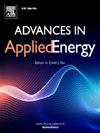A review of scalable and privacy-preserving multi-agent frameworks for distributed energy resources
IF 13.8
Q1 ENERGY & FUELS
引用次数: 0
Abstract
Distributed energy resources (DERs) are gaining prominence due to their advantages in improving energy efficiency, reducing carbon emissions, and enhancing grid resilience. Despite the increasing deployment, the potential of DERs has yet to be fully explored and exploited. A fundamental question restrains the management of numerous DERs in large-scale power systems, “How should DER data be securely processed and DER operations be efficiently optimized?” To address this question, this paper considers two critical issues, namely privacy for processing DER data and scalability in optimizing DER operations, then surveys existing and emerging solutions from a multi-agent framework perspective. In the context of scalability, this paper reviews state-of-the-art research that relies on parallel control, optimization, and learning within distributed and/or decentralized information exchange structures, while in the context of privacy, it identifies privacy preservation measures that can be synthesized into the aforementioned scalable structures. Despite research advances in these areas, challenges remain because these highly interdisciplinary studies blend a wide variety of scalable computing architectures and privacy preservation techniques from different fields, making them difficult to adapt in practice. To mitigate this issue, this paper provides a holistic review of trending strategies that orchestrate privacy and scalability for large-scale power system operations from a multi-agent perspective, particularly for DER control problems. Furthermore, this review extrapolates new approaches for future scalable, privacy-aware, and cybersecure pathways to unlock the full potential of DERs through controlling, optimizing, and learning generic multi-agent-based cyber–physical systems.
分布式能源可扩展和隐私保护多智能体框架综述
分布式能源(DERs)由于其在提高能源效率、减少碳排放和增强电网弹性方面的优势而日益受到重视。尽管部署越来越多,但DERs的潜力尚未得到充分探索和利用。一个基本问题制约着大规模电力系统中大量DER的管理,“如何安全地处理DER数据并有效地优化DER操作?”为了解决这个问题,本文考虑了两个关键问题,即处理DER数据的隐私性和优化DER操作的可扩展性,然后从多智能体框架的角度调查了现有和新兴的解决方案。在可扩展性的背景下,本文回顾了在分布式和/或分散的信息交换结构中依赖并行控制、优化和学习的最新研究,而在隐私的背景下,它确定了可以综合到上述可扩展结构中的隐私保护措施。尽管这些领域的研究取得了进展,但挑战仍然存在,因为这些高度跨学科的研究混合了来自不同领域的各种可扩展的计算架构和隐私保护技术,使它们难以在实践中适应。为了缓解这一问题,本文从多智能体的角度全面回顾了协调大规模电力系统运行的隐私和可扩展性的趋势策略,特别是对于DER控制问题。此外,本综述推断了未来可扩展、隐私感知和网络安全途径的新方法,通过控制、优化和学习通用的基于多代理的网络物理系统来释放der的全部潜力。
本文章由计算机程序翻译,如有差异,请以英文原文为准。
求助全文
约1分钟内获得全文
求助全文

 求助内容:
求助内容: 应助结果提醒方式:
应助结果提醒方式:


